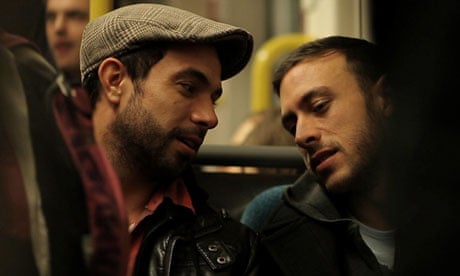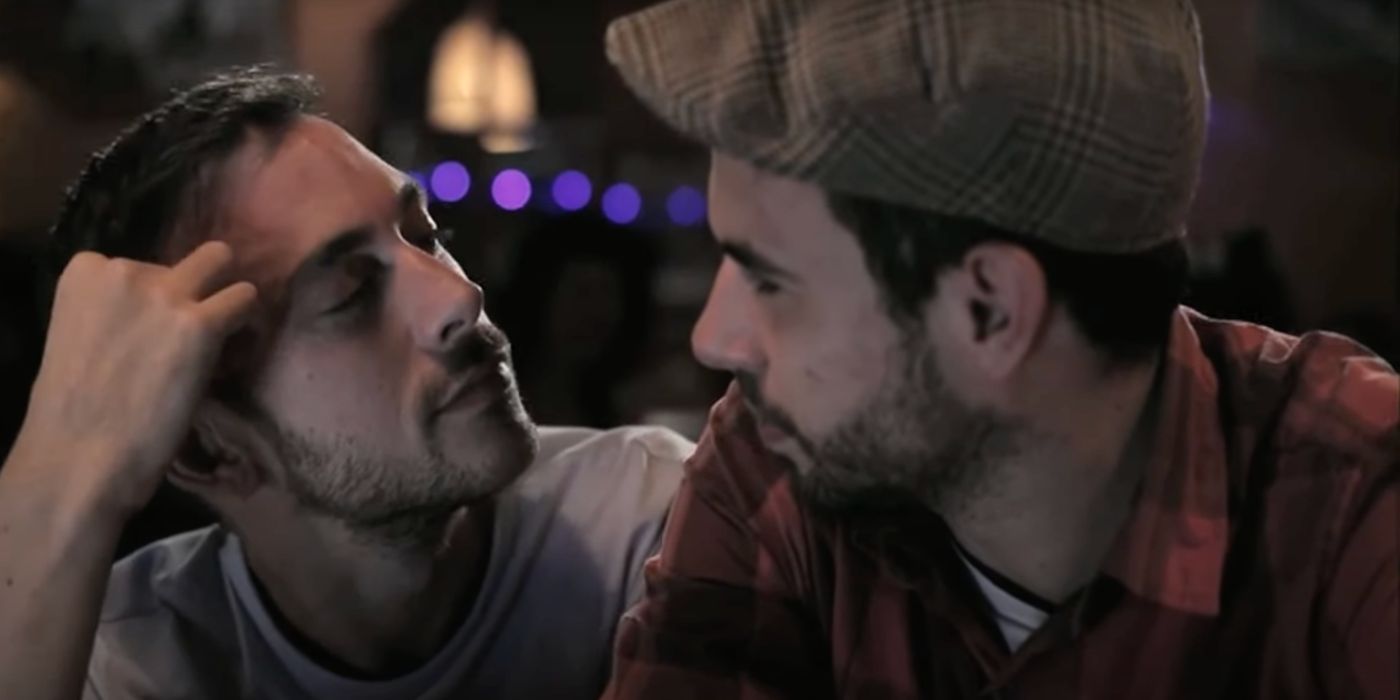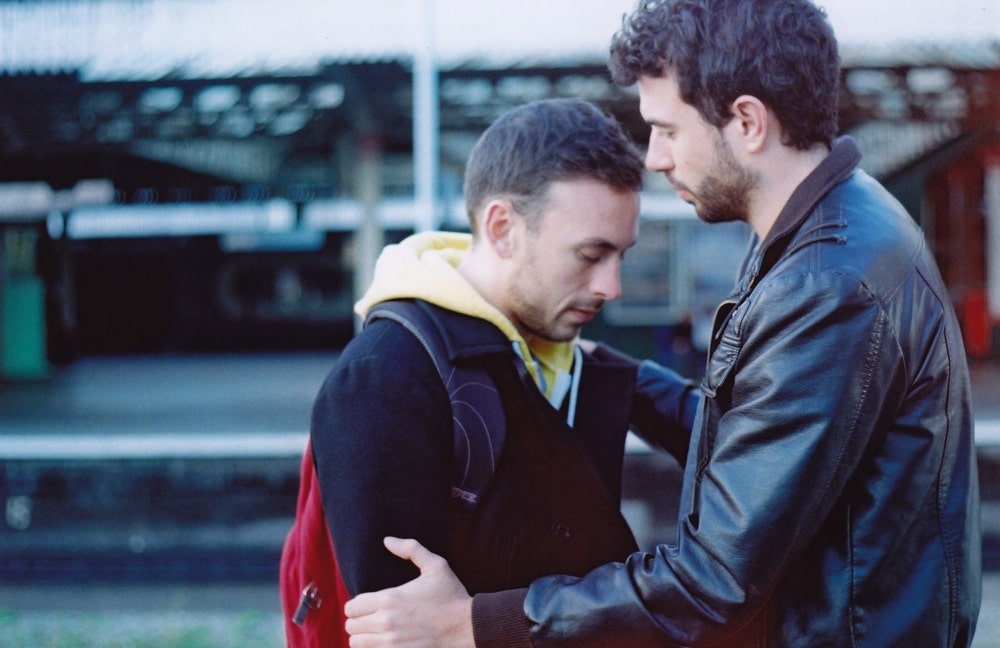Weekend
Weekend, directed by Andrew Haigh, is a 2011 UK film following a man named Russ and his short but impactful relationship with Glen, another man he meets at a gay bar. As the title of the film suggests, the relationship between Russ and Glen only lasts a weekend, with Glen leaving for Portland, Oregon, at the end of the weekend. Although the two do not "end up together" in the traditional heteronormative sense, it cannot be understated that the two had large impacts on each other's lives. I actually appreciated that the two didn't end up together; during the end train scene I was half expecting Russ to go with Glen or for Glen to stay, but I thought what happened was more realistic. Russ couldn't uproot his life for Glen, and Glen couldn't halt his trajectory for Russ, especially since the two only just met. There's something beautifully heartbreaking about the end and, as the film's ending song says, it's bittersweet.
Another thing I enjoyed about this film was that both characters were out with their sexuality. More often than not queer films are about queer characters who are not open about their sexuality (like Brokeback Mountain) or are about a queer character’s journey to come out. Coming out is important to queer people, as this movie points out, but it’s refreshing to watch a film with queer characters who are already sure of their sexuality. Although Glen was more outspoken about his identity, Russ was still out to his friends. And although Russ had trouble being more open about his identity, it wasn't because his friends weren't supportive. In fact, it seemed like Jamie, Russ's closest friend, really wanted Russ to share more about his life. For example, when Russ and his friends are together at the beginning of the film, Jamie asks Russ about his life and seems disappointed when Russ doesn't share much. And again at Russ's goddaughter's party, Jamie reaches out to Russ and wants to hear about his personal life. It is Russ's own fear that is holding him back, but with Glen's help he is able to get over that fear, sharing about Glen with Jamie and eventually even kissing Glen in public, something he had trouble with before.
Russ’s relationship with his sexuality reminded me of Sedwick’s “Epistemology of the Closet.” Russ is out to his friends, but he is not as “out” as Glen. The film makes you question what it means to be “out,” and how to navigate your sexuality within an environment where not everyone is accepting. When watching the film and reflecting on it, I first thought that I am more like Russ; I am open to my close family, but I don’t see myself as vocal about my sexuality as Glen. However, upon reflection, I guess I may be more like Glen because I use a lot of nonverbal cues that identify me as queer (at least those who know what they’re looking for).
Like another student mentioned in class, I thought this film was reminiscent of Mutt. Both films occur during a limited time frame, and both films have endings that are left open. With Weekend, we don’t know how both Russ's and Glen's lives will turn out, or if they will ever meet again. But we can be sure that neither of them is the same person on Monday as they were on Friday. It was interesting to watch the subtle but impactful changes each character experienced, and it felt very real. Perhaps it was because of the use of improvisation in the film, or because one of the actors is gay. Either way, the realistic nature of the film was something I noticed while watching it, and it was something that made the film enjoyable and probably is why it gained attention. I'm sure there are many people who watched the film that resonated with the experiences of Russ and Glen. Even if a viewer isn't queer, I'm sure there are still viewers who have experienced short but impactful interactions with others.



Hello!
ReplyDeleteI really enjoyed your post! You did a really good job talking about their differences of being out; even though both men are out with their sexualities, there is a difference on HOW out they are. It really makes you question what different levers are expected in different situations, and the nature of the closet in the first place.
Really good job!
I loved how talked about how the relationship shared between Glen and Russell cannot be understated, and I totally agree. While they are not dating by the end, and will probably not meet again, but they had an impact on each other that they will carry forever. They both helped the other heal from underlying trauma connected to their queerness that were heavily affecting them both. I really enjoyed this film for that fact, as it felt very sincere and real to me. Great thoughts!
ReplyDeleteI think that your points about being "out", with Glen being more "out" than Russel is were very interesting. Outness is kind of a scale, with some people being closeted even to themselves, and some people being sooo out that it's obvious. I also appreciate your mentioning the "non verbal cues" that indicate you're queer to those who know how to look for it. It reminds me of the lavenders that queer people would wear to tell others that they were queer, as sort of a secret code of flowers. Queer signalling in subtle, not blaring ways has been around for a long time, and it's still around but less secretive.
ReplyDeleteI really enjoyed your point about how refreshing it was that this film isn't primarily focused on a coming out journey, while many other queer films are. While the 'coming out' narrative is incredibly valuable in queer media, I think sometimes it can feel particularly overdone if that is the only kind of queer media one has. I found this film particularly nice because by allowing its protagonists to already be out, it is able to spend more time in the quiet, everyday experiences of queerness.
ReplyDeleteI think it's interesting that you describe Glen as being more out than Russell. I don't know that I agree with you. I enjoyed that they were both out, but I don't know that someone has to openly talk about every aspect of their life, or even just the romantic and sexual aspects of their life, to be seen as more out than another. I think Russell is a private person, and that's okay. I enjoyed seeing the differences between the two, and that the movie didn't make it seem like one was doing things better than the other, but that they were just different. Thanks for sharing your thoughts!
ReplyDeleteHi! I enjoyed reading your blog and agree that the two characters had a great impact on each other’s life. I am glad you pointed out how the two did not end up together and that it added to the reality of the film. I also enjoyed reading your analysis on Jamie, especially about his friendship is with Russel. It was nice to see when Russel opened more to Jamie and allowed him to see that aspect of his life. Thank you for sharing!
ReplyDelete